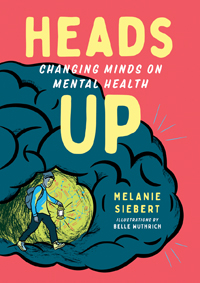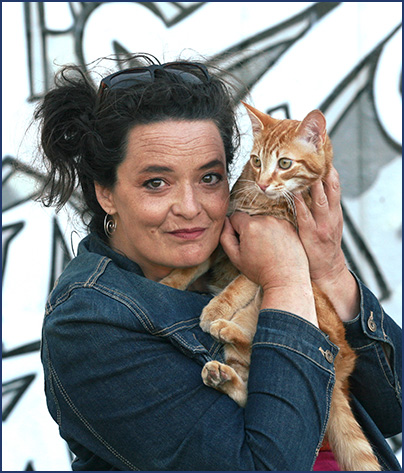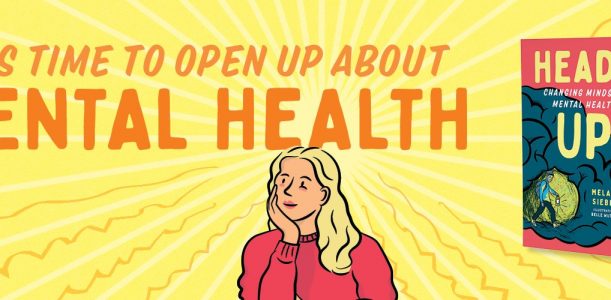
Today is National Child and Youth Mental Health Day, and we’re bringing you a special blog post from Melanie Siebert about her path to becoming a youth counsellor and why she decided to write Heads Up: Changing Minds on Mental Health.
Featuring real-life stories of people who have found hope and meaning in the midst of life’s struggles, Heads Up is the go-to guide for teenagers who want to know about mental health, mental illness, trauma and recovery.
* * *
By: Melanie Siebert
Growing up, I didn’t know much about mental health. We never even used those words in my small town.
When my best friend in high school was suicidal, I didn’t know what to do. When someone I loved started thinking the government was stealing her thoughts and became too afraid to leave the house, I had no idea what was happening. When I was an EMT on ambulance calls and we’d pick up the same people again and again, people who were dangerously drunk or high, I didn’t really understand what was going on beneath the surface.
And when I was dropping out of life, crying all the time and drowning in dark thoughts, I didn’t know I was depressed.
Gradually I learned the ins and outs of mental health. But at first this education came through difficult experiences: calling crisis lines; advocating for someone I love who was in jail because their delusions had led them to do some scary things; hunting for information and services in pamphlets from the ER, from any doctor who would talk to me, from google searches, from support groups, from people who’d been through it themselves.
These experiences showed me how limited mental health services are and how misunderstandings and judgments about mental health can hurt people.

While there’s been change over the years, there is still so much stigma that keeps us thinking of mental illness as strange, scary or shameful. This means that people who are struggling often do so in silence. And many people still end up homeless, criminalized or discriminated against in other ways, often going without treatment or support.
My experiences also taught me that even with good treatment, sometimes there’s no quick fix. Even though people are courageous and strong, it doesn’t necessarily mean a happy ending. For some, the struggle goes on and on.
I wanted to make a difference. So I decided to go back to school and get a master’s degree and become a counselor. Now teens and young adults come and talk to me about what’s going on in their lives. I try to create a safe, non-judgmental place where they can be honest and vulnerable. I love this work!
But research shows that more than half of the youth who seek mental health services aren’t able to access the help they need. I felt I needed to do more for the kids that weren’t getting in the doors.
I wanted a guide to mental health for youth that was honest and real. Something that could be in any home, library or waiting room. But I wasn’t seeing books out there that spoke to the youth I work with.
I wanted something that showcased different perspectives, that was fun to read and inspiring. I decided to write something that was both packed with research and with personal stories that show how complex and unique each person’s journey is. A book that didn’t shy away from the nitty-gritty, emotionally difficult stuff.
I also wanted to make sure that Heads Up talked about trauma and all the social factors—like racism, homophobia, transphobia, poverty, etc.—that contribute to poor mental health. When this gets missed, we start to think of mental health as just an individual thing. But if we want people to be well, we need to create a just society that treats people well.
Writing Heads Up gave me the chance to connect with so many amazing people with knowledge and real-life experience.
Shawn shared his story of living on the street as a teenager, then as a young adult having his successful music career disappear when he experienced psychosis and ended up in jail. Shawn tells how medications, a support group and writing songs helped him to find health and balance again.
Rennie talked about how she still deals with intergenerational trauma because she was taken from her Indigenous family and community as a child. She found healing through both counselling and Anishinaabe ceremonies. She explains how Indigenous cultural practices help to create balance in mind, body, heart and spirit. And instead of thinking of a really painful time as a breakdown, she says, you can see it as a breakthrough.
Lee shared their struggle with an eating disorder that started in high school while on the wrestling team. They were so scared to reach out for help, but eventually did. Now Lee is on a recovery journey that they proudly claim is not about being “normal.”
“If we want people to be well, we need to create a just society that treats people well.”
These are just a few of the real-life stories in Heads Up. Mental health is so complex. Every aspect of life factors in. So it’s interesting to explore different people’s takes on it. I believe that the more understanding we have, the more we’re able to respond with compassion and create a better world.
In my work as a counselor, I talk with a lot of youth who are having a tough time. Sometimes they have waited a long time before reaching out for help. Often because they feel broken, weird or hopeless and it’s scary to open up. Or they feel that nobody could possibly understand what they’re going through.
I wrote Heads Up for all youth who want to learn about mental health. But mostly, I wrote it for those who are struggling and feeling alone in it.
If that’s you, I hope these stories show you that you’re not alone. It’s never too late to reach out. There are many ways to find healing and hope. It’s possible.
* * *

Melanie Siebert is a youth and family counsellor in Victoria, British Columbia. She works with people to transform depression, anxiety, trauma and inner conflict into meaning, purpose and hope. She also specializes in suicide intervention and prevention. Melanie has a Master of Social Work and a Master of Fine Arts. She has also worked as an emergency medical technician, a river guide and a creative writing instructor. Her first poetry collection, Deepwater Vee (McClelland & Stewart), was a finalist for Canada’s Governor General’s Literary Award.
Heads Up: Changing Minds on Mental Health is illustrated by Belle Wuthrich, an illustrator and designer specializing in books for young readers. Based in Vancouver, Belle has contributed to more than a dozen books for kids, a number of which have won awards or been republished internationally, including the Montaigne Medal Award–winning Eyes and Spies: How You’re Tracked and Why You Should Know and the Silver Birch Award nominee Eat Up: An Infographic Exploration of Food.


